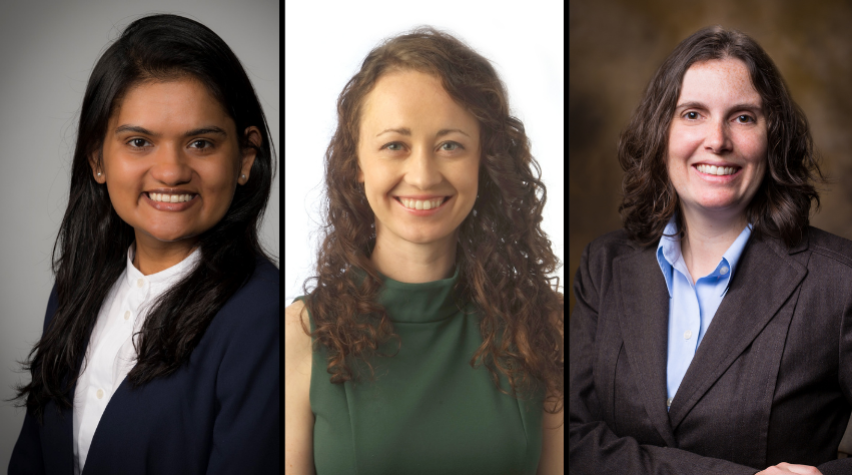
Recent leaders of WIC (left to right): Mrunmayi Kumbhalkar, Julie Renner, Shannon Servoss
In March, AIChE and ChEnected observe Women’s History Month with commentary from AIChE members and leaders about the progress of women in the engineering community.
Chartered by AIChE in 1998, and originally known as the Women’s Initiatives Committee (WIC), the Women in Chemical Engineering Community recently set its sights on becoming a more fully inclusive place for AIChE members by emphasizing its potential as a supportive community for active participants.
While women chemical engineers have emerged as leaders in AIChE and the profession over the past several decades, retention of women in engineering careers, as well as issues related to workplace equity, remain a problem.
Kumbhalkar, current WIC chair, discusses WIC’s impact
For Women’s History Month, ChEnected spoke to Mrunmayi Kumbhalkar, Chair of the Women in Chemical Engineering Community, as well as to other recent chairs of WIC. They shared their thoughts about the community’s value, the role of WIC in their own professional progress, and the need for further engagement by women and allies in engineering, to make the community as beneficial as possible to its constituents.
At the outset of her career, Mrunmayi Kumbhalkar, who is an associate research scientist at Dow, discovered AIChE and WIC and quickly recognized the opportunities that involvement in the Institute could offer. “Personally, WIC has helped me build and hone my leadership skills, extend my network, and learn about the common challenges faced by the broader community,” says Kumbhalkar. “As WIC’s Chair, I’ve had the opportunity to work with a group of dedicated women to organize events aligned to these challenges and make a positive impact.”
The positive effects of WIC involvement
Julie Renner, the Climo Assistant Professor of Chemical Engineering at Case Western Reserve University, chaired WIC in 2019. She says that “from a personal perspective, my WIC involvement has given me the opportunity to meet and work with wonderful, brilliant women in my profession who I otherwise might not have met. The community that WIC has built — where I know I can always find support and mentorship — has meant a lot to me as I’ve progress through my career.”
While, as Kumbhalkar notes, it has been inspiring to see women engineers emerge as leaders of the profession, it remains part of AIChE’s and WIC’s mission to address and eliminate inequities in the makeup of the workforce.
The ever present need for change
According to Shannon Servoss, Associate Professor of Chemical Engineering at the University of Arkansas, “Women make up a large portion of chemical engineers, but historically leave the workforce early.” Servoss, who chaired WIC in 2021, would like to see organizations such as WIC advocate for change — for example, to support at-home caregivers who must travel for work. “This is a huge burden that is often ignored, and a little support goes a long way to make meeting attendance more impactful for those who are responsible for dependent care.”
Reflecting on the attrition of women engineers in the workforce, Kumbhalkar says that “we need to align our efforts across the AIChE community to retain women in chemical engineering roles, and also to support women who are trying to come back to work after a career break.” She also says that the profession must start early in order to recruit a diverse workforce. “We can establish WIC chapters at various universities, to reach out to underrepresented groups in STEM,” Kumbhalkar says.
The IDEAL path and looking to the future
In this regard, Servoss adds, “AIChE’s IDEAL statement makes great strides to lead the AIChE community to become more inclusive. Now, we need to do the work to communicate the message to all members and make sure that we follow the IDEAL path.”
Renner also noted WIC’s celebration of diversity, and its leaders’ work toward gender equity in chemical engineering. Looking to the future, Renner says, “I expect that we might see a closing of the leadership representation gap. I also expect that organizations such as AIChE will lead from a more central position in these efforts, guided by the advice from thew Women in Chemical Engineering Community and entities like it.”
The key to getting the most from your WIC membership — and to making the community as powerful as it can be — is to take a personal and active role in WIC. Learn about all the opportunities to shape the community and your place in it, at aiche.org/WIC.
Learn more about AIChE’s Women in Chemical Engineering Community (WIC) and join today.


